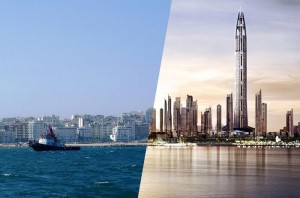Forbes
In 1999, year of the passing of King Hassan II, some North African analysts were pessimistic about the future of the Moroccan Kingdom. The country, with an ailing infrastructure and a stalling economy, was struggling hard to get out of an IMF-imposed restructuring plan.
Yet, fifteen years later, Morocco’s current ruler, King Mohammed VI, stated in an official speech on August 20 that his country’s “development model has reached maturity and deserves to join the group of emerging nations once and for all. »
Back in 1999, the challenges ahead seemed huge for the then 37-year old King who had just succeeded his father, an emblematic regional figure and a global power broker. During King Hassan’s nearly 40 year reign, Morocco became a discreet but influential piece in the chessboard of the Middle-East conflict. It also became a “pivotal country” in the region, dealing with issues such as interfaith dialogue and political mediation.
The economy, however, was not doing as well as diplomacy. Heavily dependent on agriculture, Morocco could hardly adjust to globalization and was unable to generate a strong private sector. Today, Morocco is still ranked as an underdeveloped country, but the economic situation has changed dramatically , thanks to a combination of three endogenous factors.
Location, Location, Location
Located at the strategic crossroads between North and South, East and West, Morocco exploited aggressively its geostrategic competitive advantage and became throughout the years a potential business and finance hub and a gateway to West Africa. Efforts were made to upgrade infrastructure and to attract more Foreign Direct Investments (FDI.The largest African by its coverage port was built in the mid-2000 in Tangiers, with state of the art facilities. French car manufacturer Renault-Nissan installed its Dacia Factory nearby in 2012, creating several thousand jobs in the region and bringing to Morocco hundreds of sub-contractors. The aeronautics industry is booming also and Morocco succeeded in attracting leading companies like Canada’s Bombardier, which injected a $200 million investment to build a factory near Casablanca. The highway network was extended from 100 km in 1999 to 1600 Km in 2014; urban tramways are operational in Casablanca and Rabat, while a bullet train is to connect Tangiers to Marrakech by 2016. In short, Morocco started to position itself in the regional industrial map.
“Democratic Pragmatism”
Despite recurrent criticism by some human rights organizations, Morocco’s march towards democracy has been steady over the past fifteen years. Political prisoners were released as early as 2000. An equity and reconciliation commission was created in 2004. Gender equality was promoted, leading to a global reform of the Family Code in 2004. During the “Arab spring”, Morocco was able to deal with nascent protests by amending its constitution and reshuffling powers between the Palace and the Government. Of course, a lot remains to be done in order for Morocco to achieve genuine democracy, and political opponents are very vocal about the improvement that needs to take place. Yet, they can do so without the fear of being thrown in prison. As a Moroccan official once put it during one of our conversations: “You can’t leapfrog democracy, you have to live it.”
African Plan
During the last decade, Morocco also sought to position itself as the next African economic superpower, just behind South Africa and Nigeria. Since 2007, Morocco has been trying hard to diversify its economy and to boost exports towards West Africa while Moroccan companies,especially in the financial sector, pursued an aggressive growth strategy in the continent and are now present in 25 countries. According to several experts, Morocco’s move south is an attempt to reduce its economic dependence on European markets, including with its historical partners France and Spain.
Like Turkey at the end of the nineties, Morocco believes that exports are the key to reach the next level of development. If this strategy succeeds, it might well be the much-needed “accelerator” that would help the country take its annual growth from the average 5% of the last fifteen years to a two digit growth over the next decade.
Abdelmalek Alaoui, Contributor
I write about North Africa, the U.S and International relations FULL BIO




